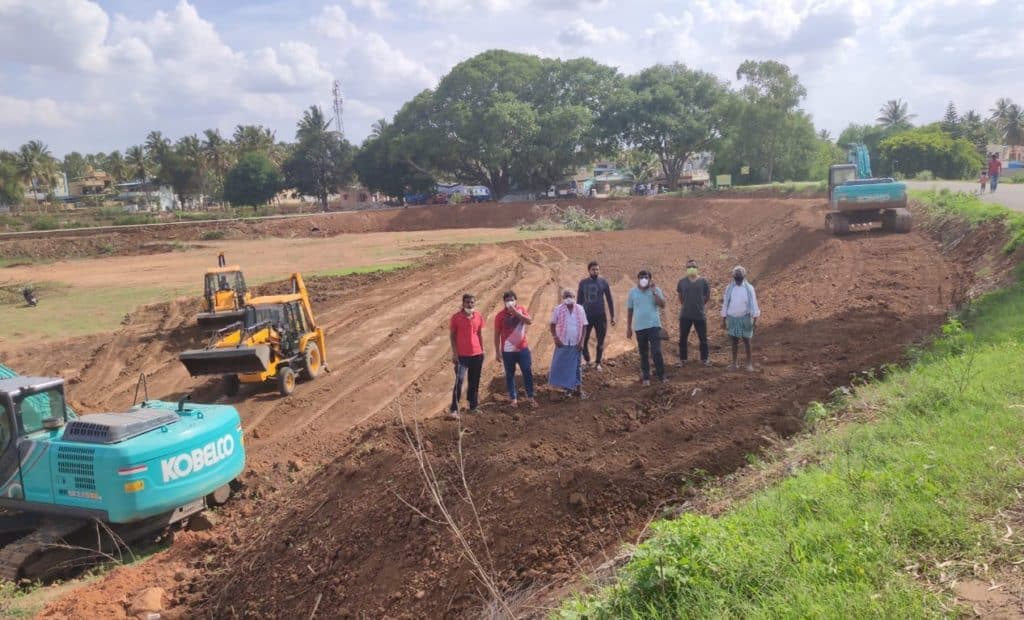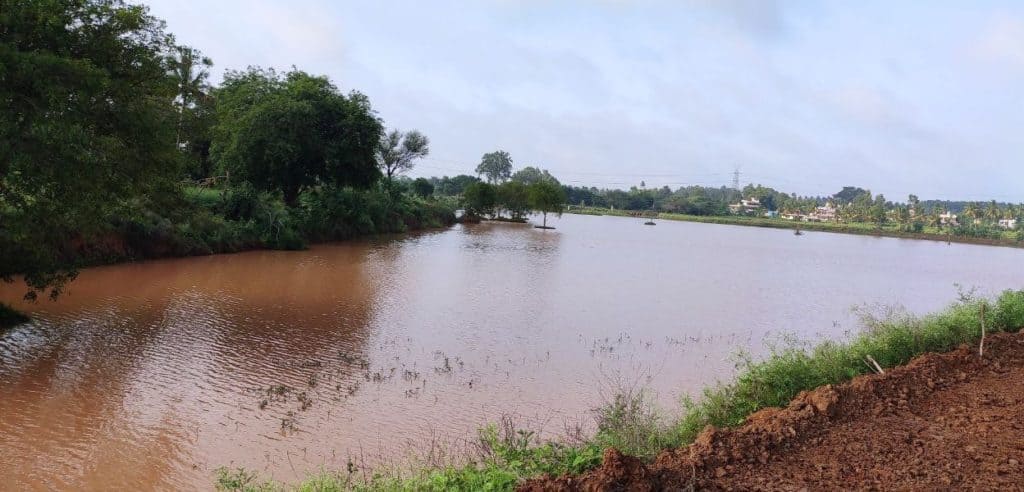Thanks to a crowdfunding effort that raised around Rs 10 Lakhs and two months of intensive work by community residents, local villagers and workers from the panchayat starting April 2020, the residents of Zed Earth, a gated community in Dodaballapur, haven’t spent a single rupee on water tankers so far this year. In the past, their annual cost on tankers could go up to as much as Rs 2 Lakhs depending on the ground water situation.
“This is the only year when we have not spent a single rupee on buying water,” says an elated Anil Kashyap, resident of Zed Earth for the past eight years. Kashyap had initiated the rejuvenation/restoration of an old abandoned lake, Kadathanamale Lake, in Kadathanamale Village located just behind their gated community.
The initial cost of lake rejuvenation was completely borne by volunteers from Zed Earth. The current costs of maintaining the lake of around Rs 10,000 per month is also borne by the community. A full time gardener, whose salary is paid by the community, looks after the basic upkeep and cleanliness of the area.
Read more: MOUs or no MOUs, citizen groups continue the fight to save Bengaluru’s lakes
How it all started
However, Kashyap does not give complete credit to the rejuvenated lake for the community being able to go tanker free. “The lake is just one part of it,” he says. “We were consuming, on an average, 60,000-70,000 litres of water per day. So the community acted on different aspects. That brought our water consumption, which is entirely drawn from borewells, down to 18,000-20,000 litres per day”..
That Bengaluru received heavy rains last year certainly contributed a lot. But other steps the community took to reduce water consumption also helped. Like
- Smart metering (to monitor water consumption)
- Digging recharge pits/wells around the community which now has at least 25-30 active recharge pits. Most of the rainwater is getting directed to the recharge wells.
- Planted around 3500 trees in the past 2-3 years in and around the community.
Kashyap explained that setting up rainwater harvesting systems independently for each house would cost up to Rs 1 Lakh per home. “So in a community with 100 independent houses, that is a lot of money. Instead, that money used for rejuvenation of water bodies in and around residential areas, ultimately redirecting rainwater to lakes and ponds, was a better option”.
Widespread urbanisation has resulted in many of Bengaluru’s lakes either being encroached, turned into dumping yards or simply vanishing. The city today faces a very real threat of losing its wet cover with just 17 out of its 51 lakes managing to survive.
The 52-acre dry and abandoned lake just behind their gated layout was being used for dumping construction debris. And three years back, Kashyap took it upon himself to restore this water body.
To begin with, the dumping of construction debris was stopped with the fencing off of the lake area. Then efforts were initiated to involve the community in the process.
“Initially there was a lot of apprehension,” he recalls. “Some of the villagers wanted to know why I was interested in developing the lake. It took about a year to convince them that it was for everybody’s good. Eventually the local Panchayat and the MLA S R Vishwanath, who had won from the Yelahanka assembly constituency, came along”.
With their support, a basic lake measurement was done and the fence was built around the area. Then there was a long wait for the government to notice and take up the lake’s rejuvenation. The wait seemed never-ending. That is when Kashyap decided to take things in his own hands.


Taking the community along
The Covid-induced lockdown came as an opportunity in disguise. On a Sunday of April 2020, the residents of Zed Earth, locals, the Panchayat members and the MLA came together and decided to start the work themselves.
“It happened just like that, there wasn’t much of a plan,” says Kashyap “We didn’t have any funding or funding plan in place. I was determined to take this forward on my own, and slowly people started coming forward”.
The trucks, machinery, JCBs, etc were provided by the local Panchayat for free. The fuel and other running costs were borne by residents of Zed Earth. Manpower support came from the villagers and the layout residents. “The whole project was financed through crowd funding by residents of the layout,” explains Kashyap. “The government did not allot any money. Neither was funding available from any other source. However, MLA Vishwanath made sure there were no roadblocks”.
Read more: A to Z guide to Bengaluru’s lakes
Going forward, Kashyap and his team of volunteers are looking at making the lake a bird habitat. “We have planted trees that are suitable for bird nesting. Even today there are many birds visiting this water body. But as the trees grow there will be more birds coming in”.
The volunteers have planted a lot of trees and creepers in the pathways to hold the soil, instead of using concrete. They also wish to beautify this lake, provided they are able to raise more funding. Right now, with limited donations from residents, they are only able to do the bare minimum.
In fact, the successful rejuvenation of Kadathanamale Lake has not just helped the residents of Zed Earth, it is also benefiting nearby farmers. The increased ground water level in the lake’s surrounding area has prompted several farmers to put borewells for irrigation of vegetable farms.
Kashyap now wants to first stabilise this lake and then survey a five kilometer radius around the community to see if there are other lakes or water bodies that can be rejuvenated.
According to IMD the annual rainfall of Bengaluru in both 2020 and 2021 was over 1,200mm. This year it has already received 254.1mm of rainfall. Yet the water bills of other societies are skyrocketing. This makes restoring abandoned water bodies even more urgent.
Other housing societies too should now get involved, talk to local villagers, work with them and make them realise that restoring water bodies is in everyone’s interest.
“It looks daunting in the beginning but once you take the first step, it is very doable,” says Kashyap.
Hats off the public of the village and effort. Govt should learn from them.
Superlative Initiative !
Very good effort, to recharge ground water and there by helping people in and around the lake. A salute to the team who did it
Wonderful feat ! Congratulations to community, villagers and Anil
Necessity is the mother of invention. But, in any case, deserves appreciation for initiative and coordinated effort. People residing in apartments located near lakes take example and start working on these lines by contacting these men to collect needy information without waiting upto total draining of ground water.
Actually, most of the claims are baseless. I’m a resident of Zed Earth. I still pay for water. I have donated for the cause. I am appreciative of the effort. Just to ensure that baseless claims are being made. The reporter should have met a few residents and asked questions
Reporters shouldn’t use poetic licence and should stick to the facts. Nice of you Mr Thampi for pointing out the few errors in the article. Having said that I’m sure a lot of people have benefited from this exercise. It also gives a sense of achievement and happiness to all involved. People may not have a zero water bill, but they definitely would have benefited from lowered bills. The article too was well presented by Supriya Khandekar.
Dear Sir,
Your association has not spent a single rupee on tankers in 2022 till May. The article clearly mentions it is about tanker expenditure only.
You will still need electricity to draw water from the borewell.
Thanks for stopping by
It looks daunting in the beginning but once you take the first step, it is very doable.
Powerful words.
Appreciate the Zed Earth residents who believed in Mr. kashyap’s initiative. Also the Panchayat and Villagers. Unfortunately though it sound positive about MLA clearing the blockades, it would be his duty to help the initiative with some funds. He is spending on some non-essential works.
Great to know how one man can start the change for the benefit of the society. Also highlights the importance of lake in increasing the groundwater level.